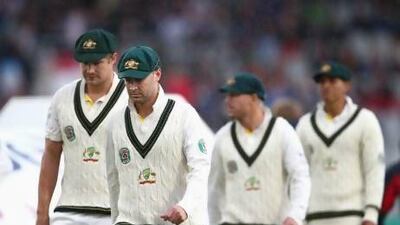It may have been hard to take the positives from the realisation that a third successive Ashes series will end with England departing with the little trophy urn, but there genuinely were grounds for optimism for Michael Clarke, even if he probably not feel it at the time.
Consistent rainfall ensured that Australia's attempt to get the 10 English wickets they needed to keep their Ashes hopes alive went unfulfilled, falling seven wickets short.
But as Clarke sat with his men on the balcony of the team's dressing room at Old Trafford yesterday, watching their chances being washed away by the rain, he could take heart from the fact that his side had been the dominant force of the Test.
No one now will ever know if Joe Root, Ian Bell and the England middle and lower order would have survived the onslaught from a fired up Ryan Harris, Peter Siddle and the rest of the Australia attack in the final two sessions, but given how England had struggled in the morning session, it would have been a tall order for them to overcome the challenge.
It may not have been the victory they had so desperately needed, but it was a considerable improvement on the horror show at Lord's in the second Test, when defeat had come by the hefty margin of 347 runs.
Australia have had to get used to defeat after years of dominance, but their abject display in being bowled out for 128 in the first innings in London was a new low.
Realistically, given how the first two Tests had gone, three successive Australia wins in England was always going to be night on impossible, so the goal that Clarke and coach Darren Lehmann would have set was to improve and have something to build on for the winter Ashes series, when the sides meet again on Australian soil.
In that respect, job done. Australia batted better than England and they bowled better in Manchester and will, quite reasonably, believe they would have been celebrating a victory had Mother Nature not intervened.
To the casual observer, it would not be unreasonable to question the worth of the remaining two matches in Durham and at the Oval, with the destination of the Ashes having been already decided.
The important word here is momentum. The first Test in Brisbane begins on November 21 and the goal for Australia now is to be raring to go in their objective to stop England winning a fourth successive series.
Finish this present series strongly and send some pointers to the inconsistent England team on what they can expect in Australia.
Clarke has impressed with his intuitive captaincy, even if the results had not backed that up, but he finally came to the party with the bat at Old Trafford, his 187 a fantastic innings of stroke play that dragged his side kicking and screaming into the proceedings.
He was the one batsman that England rightly feared going into the series, and he will now look to continue putting them to the sword for the remaining two Tests to try to demoralise them.
Chris Rogers and Steven Smith also both batted well in the Test and the 527 for seven declared score that Australia put together in their first innings was by far the best batting display either side had mustered thus far.
Australia's pace bowlers had been the team's best-performing area in the first Two Tests and they again impressed in Manchester. Bowling out England on a flat wicket for 359 was no mean feat.
The one common thing in every Test is that Australia have made a great start with the ball in each innings, but not had the killer instinct or the match-changing spell that a Glenn McGrath, Brett Lee or Craig McDermott of past series battles could have offered.
This is how each of England's first five innings in the series have looked: 124 for four, 11 for two, 28 for three, 30 for three and 110 for four.
But each time, they had been able to move on from there to record decent totals as Australia lacked the cutting edge to finish them off when they were reeling.
Clarke and Lehmann will challenge their squad to raise themselves from disappointment to win, ideally, both the remaining Tests, but at the very least one of them.
All focus must change now to the first Test in Brisbane, and that includes getting the team make-up right.
In fairness to Lehmann, this is not his squad. He inherited it after Mickey Arthur was ejected from the coaching hot seat and he will almost certainly make changes between the end of the series and Brisbane.
But he can make adjustments for the start of the fourth Test at Chester-le-Street on Friday, beginning with sorting out the batting order, something that they have repeatedly not done thus far.
David Warner, for all his flaws, is an opening batsman, not a No 6 player, where he was positioned after his recall. He did not have the greatest match at Old Trafford, but he played with good aggression after being promoted back up the order in the second innings and sacrificed his wicket in the pursuit of quick runs.
It is fair to say the Shane Watson-as- opener experiment has been an unmitigated failure, averaging just 24.33 in six innings.
His bowling has proved more than useful with his 61 overs going for just 114 runs, giving Clarke control over England's run rate as his pace bowlers have been given a break during innings, and for that reason he justifies keeping his place in the side.
Just not as an opener. Move Warner back unto the top, drop Watson to six, and try to repeat the efforts of Old Trafford in the remaining two matches.
Sounds simple.
Oh, and hope for better weather.
Follow us

